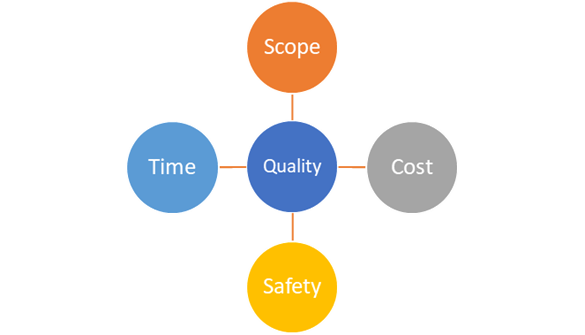The Big Picture
A research study on integrating SDGs into processes & management

The niche market of green construction focuses on environmentally conscious techniques for both new construction and renovation projects within the broader construction industry. Acumen estimates that this market will exceed US$770 billion in value by 2030. Green construction can address social, economic and environmental challenges, including deforestation, carbon emissions and poor energy management practices. Acknowledging the impact of green building on other niche segments is essential.
This study strived to solve three critical problems within the project management (PM) industry.
-
First, it sought to investigate potential differences between global regions in how organizations within the green construction industry leverage corporate shared values to gain a competitive edge.
-
Second, it aimed to evaluate whether project management practices in the U.S. effectively promote the sharing of corporate values during project delivery.
-
Lastly, the study aimed to determine if formal certifications are necessary to support project management teams in upholding shared values throughout the project delivery process.
The study assessed an organization's need to expand its corporate social responsibility initiatives and create a competitive advantage through shared values from its stakeholder ecosystem. The study aimed to establish a correlation between shared corporate values, project performance, culture and the success of the organization's total quality management programs. To achieve the goals set forth, the following research questions were developed.
-
RQ 1 – Do corporate shared values enhance project performance among all organizational stakeholders?
-
RQ 2 – Is there a correlation between an organization's corporate shared values and the positioning of the green construction industry?
-
RQ 3 – Is considering the influence of a project management office’s (PMO) culture on the outcome crucial?
-
RQ 4 – Is there a correlation between an organization's level of corporate shared values and the success of its total quality management program?
The study found organizations committed to the green construction industry, thus creating a business strategy around sustainable development goals, must align their internal processes and standards to support them. The recommended approach for an organization in transition to a sustainable delivery system includes:
1. Integration of Agenda 2030
-
-
Economic Security: Companies should contribute to the UN Agenda 2030 through policy and standards development. This includes competitive salaries and benefits, developing environmental, health and safety policies, and engagement with stakeholders at all levels, explicitly empowering those employees who interact with the customer in the most detailed ways.
-
Resource Management: Organizations in the green construction industry should place their project workflows in a situation that promotes the circular economy, notwithstanding recycling, responsible procurement and labor utilization.
-
Value Chain: Business partners, contractors and suppliers all play an influential role in achieving sustainable goals. However, each stakeholder group plays a varied role in achieving those goals. Contractors play a critical, substantive role in delivering green projects to the customer.
-
2. Stakeholder engagement
-
-
Communication: Communication of organizational goals, including commitments to sustainability and SDGs, must be proactive and straightforward. This includes transparent discussion on how operations will achieve these goals and how project management delivers projects to customers.
-
Strategic Partnerships: Creating a competitive advantage, especially in sharing corporate values, organizations must be able to align their principles and values with other organizations to ensure that the relationship with the customer is successful.
-
3. The role of project management
-
-
Implementation: Project management is critical to developing and promoting the organization's culture in green construction. PM, especially the PMO, is a central stakeholder in the success of integrating shared values within the stakeholder network.
-
Stakeholder Engagement: Project leadership develops influential skills to manage, monitor and control all stakeholder groups throughout their project’s life cycle. This expertise fosters the organization’s values throughout discussions and meetings.
-
Project Controls: Utilizing project methodologies such as schedule control and earned value management is essential in controlling key performance indicators, including procurement, the voice of the customer and continuous improvement of the project team.
-
4. Leadership development
-
-
Applied Learning: Leadership behaviors should not be justified through organic conversations. The organization's HR function is critical in support of the development of the organization’s talent. Working with the project leadership, formal education through training and conference attendance formally establishes the core values of the leadership, sharing them throughout all levels of the organization.
-
While key performance indicators (KPIs) are widely used throughout Agenda 2030, presented a comprehensive formula for total project performance that focused on everything from billing to cost, schedule and stakeholder performance. While the metric was all-inclusive of all areas of a project to measure its effectiveness, the author presented an open way to show a weighted average using the Analytic Hierarchy Process by Sataay. Nassar's inference in using AHP is to ensure an organization verifies a project's performance as it speaks to meeting the strategic and operational goals.
There is precedence in having both long and abbreviated formulas to meet similar outputs. Rather than utilizing a complete range formula, an abbreviated formula that supports the core Sustainable Development Goals (SDGs) provides adequate insight into all functions of a construction project.

Essential Project Performance Criteria
Using a concise formula that includes the following variables – stakeholder management (client satisfaction), cost (cost performance index, CPI), schedule (schedule et al., SPI), safety (safety et al., SFI) and quality performance (QPI) – creates critical performance indicators to measure success.
The weight of each variable must be justified, and the use of the metric in measuring the project's performance validated. Nassar (2008) suggests utilizing the five key focuses – safety, stakeholder management, time, cost and quality – to create an alternative formula. This provides a second opportunity for continued research. The formula can be presented as follows:
PPI = Safety Scorex + Stakeholder Scorex + QPIx + CPIx + SPIx
This study examined the implementation of green project management practices in organizations as part of their commitment to SDGs. It explored whether having a total quality management program enhances corporate shared values across the stakeholder value chain. The findings indicate that organizations do not need certification to effectively support the UN’s 2030 Agenda for Sustainable Development.
To align with these goals, organizations must ensure their processes holistically support them. This includes poverty reduction through training, competitive salaries and environmental programs that engage stakeholders in responsible practices. Business partners and suppliers play a crucial role in executing projects, and effective communication through stakeholder engagement is essential.
A strong organizational culture, defined by strategic leadership, is vital. Successful implementation of sustainability objectives relies on proactive leadership in human resources and operations. By fostering a supportive culture, organizations can enhance motivation among employees and stakeholders.
Project management is key to integrating sustainable development and shared values within stakeholder ecosystems. Project leaders must apply engagement techniques and monitor activities through earned value management, emphasizing the importance of education in promoting SDG values in the global economy.

Dr. Joshua Bosell, PhD, PMP, is the director of project management for Dalkia Energy Solutions. A graduate of the University of the Cumberlands (2024) with a PhD in Business Administration (Project Management), he is also a Project Management Professional (PMP) and Six Sigma Black Belt. Dr. Bosell’s expertise extends beyond traditional project management, with a background in system integrations, IT networking, and building automation. This diverse experience has shaped his focus on how energy conservation can improve occupancy health and operational sustainability. His research focuses on the integration of corporate shared values into project management value streams to enhance customer outcomes. His ongoing research explores the impact of the Sustainable Development Goals (SDGs) on project management workflows.
References
Saaty, Thomas L. (1982). Decision Making for Leaders. Belmont, CA: Lifetime Learning Publications.
Nassar, N. (n.d.). An integrated framework for the evaluation of the performance of construction projects. Retrieved September 2023, from https://www.pmi.org/learning/library/evaluation-performance-construction-projects-6751
Read more on Sustainability and Research & Benchmarking or related topics Sustainable Facility and Performance Measures
Explore All FMJ Topics








